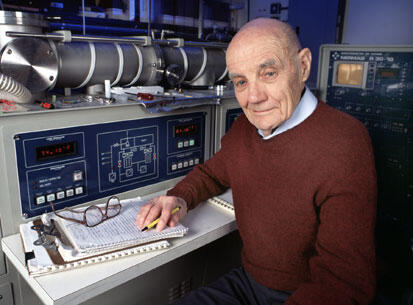
Dec. 10, 2010
Nobel Laureate John Fenn, VCU Professor of Chemistry, Dies at 93
Share this story
Virginia Commonwealth University chemistry professor John B. Fenn, Ph.D., who in 2002 was awarded the Nobel Prize for his revolutionary research on analyzing biomolecules, died today. He was 93.
In a poignant turn, Fenn’s death came the same day the 2010 Nobel Prizes were being awarded in Oslo, Norway. The Nobel Prizes are held annually on Dec. 10, the anniversary of the death of Alfred Nobel, the namesake of the awards.
Fenn won the Nobel Prize in Chemistry for his invention of a pioneering technique that allows researchers to detect and characterize large biological molecules, such as proteins, with unprecedented accuracy. The technique, called electrospray ionization, is now used in chemistry laboratories around the world to rapidly and simply reveal what proteins a sample contains, revolutionizing the development of new medicines.
Fenn caused a “minor revolution” when he succeeded in making intact, large proteins fly through the mass spectrometer so that they could be measured, said Professor Astrid Graslund, secretary of The Nobel Committee for Chemistry, during the 2002 awards ceremony. Before that, only small- to medium-size proteins could be identified and measured using mass spectrometry.
"There’s an awful lot of luck in this,” Fenn said at the time. "In fact, there’s a lot of luck in science. To succeed as a theorist, you have to be good. To succeed as an experimentalist, you only have to be lucky. As an experimentalist, you can go through life kicking over a lot of stones, and, if you’re lucky, you’ll find something.”
VCU President Michael Rao, Ph.D., said Fenn’s contribution to science is immeasurable and that “he represents the great potential that exists at so many levels at VCU.”
Five months after accepting the Nobel Prize, Fenn was elected into the National Academy of Sciences. Membership in the academy is considered one of the highest honors accorded to a U.S. scientist or engineer and recognizes those who have made distinguished and continuing achievements in original research.
“John Fenn was one of those scientists whose discovery opened up an entirely new field to investigation; in his case, proteomics – the hallmark science of the post-genomic era,” said Thomas Huff, Ph.D., vice provost for VCU Life Sciences.
“John Fenn was always generous with his time, always available to students and colleagues for discussions and a wonderful mentor,” said Fred Hawkridge, Ph.D., professor of chemistry and interim dean of the College of Humanities and Sciences. “John remained totally unchanged by receiving the Nobel Prize. VCU is fortunate to have had John as a colleague for the last 16 years.”
Scott Gronert, Ph.D., chair of the VCU Department of Chemistry, said, that Fenn was beloved by the department’s faculty and staff and continued to work, even in his 90s, nearly every day.
“His never-ending enthusiasm for science, his giving spirit and his willingness to argue resolutely for doing the right thing will be greatly missed,” Gronert said.
Fenn joined VCU in 1994 as professor of analytical chemistry in VCU’s Department of Chemistry after more than 20 years at Yale University. He also was an affiliate professor of chemical engineering in VCU’s School of Engineering.
“For a man of such great intellect, John was quite accessible. His humility and good humor made him a pleasure to engage,” said Russell D. Jamison, Ph.D., dean of the VCU School of Engineering.
Fenn’s latest research at VCU, supported by National Science Foundation grants, focused on measuring the affinity of molecules for water and on analyzing particulate matter that might hold answers one day to how atmospheric pollutants cause diseases.
In June 2007, VCU established the John Fenn Chair Professorship in Chemistry in recognition of his research contributions.
Fenn received a B.A. in chemistry from Berea College in 1937 and a Ph.D. from Yale in 1940. He worked for about a dozen years in process development at Monsanto Co. and Sharples Chemical in Michigan and then spent seven years in Richmond at a small company, Experiment Incorporated, that specialized in combustion engines. In 1959, he was named director of Project SQUID, a U.S. Navy program of basic and applied research in jet propulsion administered by Princeton University, where he became professor of aerospace and mechanical sciences.
Fenn joined the Yale faculty in 1967 as professor of applied science and chemistry, a post he held for 13 years. From 1980 until his retirement in 1987, he was professor of chemical engineering. He became a research scientist at Yale after being named emeritus in 1987 and held that post until moving his lab to VCU in 1994.
He served as a visiting professor at Trento University in Italy, the University of Tokyo, the Indian Institute of Science at Bangalore and the Chinese Academy of Science in Beijing and as a distinguished lecturer at several other institutions. Author of one book and more than 100 papers, he was the sole or co-inventor on 19 patents.
Subscribe to VCU News
Subscribe to VCU News at newsletter.vcu.edu and receive a selection of stories, videos, photos, news clips and event listings in your inbox.







